Myth: Hideo Kojima said that Portable Ops and Rising are canonical
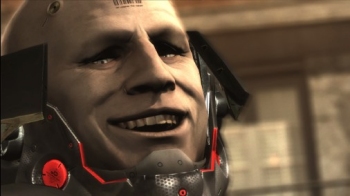
Fact: Kojima only considers the games he has directed as part of the “Metal Gear Saga.”
By Jen Miller, Posted on March 30, 2016
One of the biggest hot button issues for fans of the Metal Gear series is the status of Metal Gear Solid: Portable Ops and Metal Gear Rising: Revengeance in terms of the overall canon. Despite the fact that neither game was directed by series creator Hideo Kojima, they were initially developed with the intention of taking place within the same timeline as the eight games that were directed by Kojima. The fans, with their desire to see the series’ lore expanded, accept these games as part of the overall storyline of the Metal Gear Saga. This idea has become so widely accepted and many fans will argue that “Kojima said that Portable Ops and/or Rising is canonical.”
Has Kojima actually said that though?
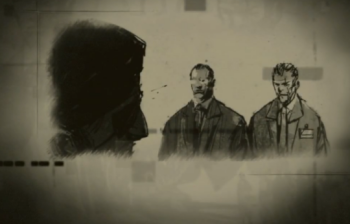 “ZOMG THIS IS SO IMPORTANT THAT I KNOW WHERE THIS CONTEXTLESS IMAGE OF ZERO AND BIG BOSS CAME FROM!!!”
“ZOMG THIS IS SO IMPORTANT THAT I KNOW WHERE THIS CONTEXTLESS IMAGE OF ZERO AND BIG BOSS CAME FROM!!!”With Portable Ops, the game was indeed announced as “The Missing Link” in the Metal Gear Saga, and a prerequisite for understanding the story of Metal Gear Solid 4: Guns of the Patriots. As it turned out, all Guns of the Patriots did to link back to Portable Ops was show a few stills in Big Mama and Liquid Ocelot’s Microsoft PowerPoint presentations disguised as cutscenes. With the release of Metal Gear Solid: Peace Walker, fans began to question whether or not Kojima still considered the San Heironymo Incident part of the Saga, or if he “left all that crap behind.”
In a 2014 interview, it appeared that Kojima had finally settled the issue once and for all.
It seems simple enough; the overall plot for Portable Ops is part of the Saga, while a few small details are not part of the Saga. Fans who have defended Portable Ops jumped in celebration of what appeared to be vindication for their game.
However, what many fans fail to mention is the second part of Kojima’s answer. Worse yet, due to understandable time constraints imposed on Ken Mendoza’s mid-interview translation, the wording of Kojima’s answer came off as vague and unclear. Fox Topus, who is fluent in Japanese, took the time to do a clearer translation of Kojima’s answer.
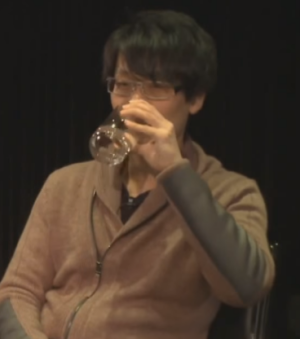 Hideo Kojima, trying to come up with a way to weasel out of answering questions about canonicity.
Hideo Kojima, trying to come up with a way to weasel out of answering questions about canonicity.Note that Kojima began the second half of his answer by dismissing the first half of his answer (“rather than saying” if it’s canon or not), and instead emphasized that he personally divides games he directed, labeled “A Hideo Kojima Game,” from games he’s only produced, such as Metal Gear Rising: Revengeance.
The story for Metal Gear Rising was changed, from an interquel between Metal Gear Solid 2: Sons of Liberty and Guns of the Patriots titled Metal Gear Solid: Rising, to the spin-off set four years after Guns of the Patriots that we ended up getting.
While Platinum Games developed the game, Kojima Productions remained in charge of the story. This has given rise to the misconception that Hideo Kojima himself wrote, or at least was actively involved with, the story of Metal Gear Rising. However, Kojima has made it quite clear that he had no involvement with Rising’s story.
In September of 2012, creative producer Yuji Korekado declared that the game was canonical to the Metal Gear timeline. Still, it must be noted that Hideo Kojima’s artistic ambition and Yuji Korekado’s practical business sense have clashed in the past, with Kojima going so far as to ask him, “How on earth can you be developing games with that mindset?”
When asked if Metal Gear Rising is an integral part of the series’ storyline and if the game’s events will be “reflected” in future games, Kojima’s answer was just as complicated as the answer he gave about Portable Ops.
So again, seems simple, right? Not quite. Kojima continues by giving a less absolute answer than Korekado’s;
Kojima was actually even more explicit about his feelings on Metal Gear Rising’s canonical status.
While it’s true that spin-offs like Better Call Saul, Star Trek: The Next Generation, and Angel are all canonical to their source material, it appears that to Kojima at least, there’s a clear distinction between “spin-offs” like Metal Gear Rising, and “the numbered series, the official canon Metal Gear.” Some may counter this argument by saying “well, Peace Walker isn’t numbered, yet it’s still canon.” However, Kojima sees Peace Walker as a numbered entry in every way despite not being numbered, to the point where he originally intended it to be a numbered entry.
Yet again, we see Kojima using “spin-off” as a synonym for “non-canon”, when referring to Metal Gear Acid (though at this point, he still considered Portable Ops to be a “side-story”).
While Kojima did not elaborate on how Rising was different from the post-Guns of the Patriots story he had in mind, one could argue that Kojima’s answer is too vague to draw any definitive conclusions from and that we must fall back on Yuji Korekado’s answer and assume that Rising is indeed canonical.
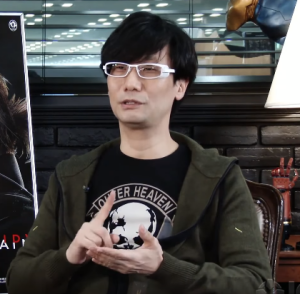
Fortunately while promoting Metal Gear Solid V: The Phantom Pain, Hideo Kojima finally decided to cut the bullshit and make his feelings about the Metal Gear Saga crystal clear. When listing all of the games in the Metal Gear Saga, Kojima only counted the games that he directed—this excluding Metal Gear Solid: Portable Ops and Metal Gear Rising: Revengeance.
The myth that Kojima confirmed Portable Ops and Rising as canonical ironically comes from his statements concerning this “Saga.”
If Kojima merely saying that Portable Ops and Rising are related to the “Saga” is enough to prove that those games are canonical, then by that same logic, Kojima excluding those games when listing all of the games in what he considers the “Metal Gear Saga” is more than enough to prove that those games are not canonical to him. Clearly, Kojima’s emphasis was on how he divides “A Hideo Kojima Games” from games that he only produced, and that Rising is a “parallel story” because it doesn’t reflect his idea for what happens after Guns of the Patriots.
To add insult to injury, neither Portable Ops or Metal Gear Rising have been featured in an official timeline since 2012.

Even The Phantom Pain’s timeline does not reference the San Heironymo Incident.

Likewise, Piggyback’s Metal Gear Solid V: The Phantom Pain: The Complete Official Guide dismisses Rising‘s place in the Metal Gear Saga.
Metal Gear Rising takes place in 2018, thus it has been cut off from “the story of the Metal Gear series.” The official strategy guide was written in conjunction with Hideo Kojima, who wrote the guide’s foreward and provided background commentary for the Collector’s Edition’s art section. Pages 352-353 of the same guide also features a timeline that—you guessed it—excludes any reference to San Heironymo or whatever the fuck happened in Rising. (NOTE: MGS4 spoilers in the image below).
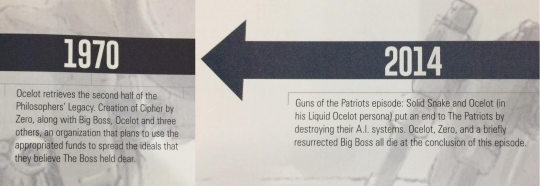
Of course, now that Hideo Kojima has left Konami, Kojima no longer retains control of the Metal Gear series. It is very likely that, when METAL GEAR SOLID 6: IRANIC CONTRA is announced, Konami will dismiss all of Kojima’s prior statements and count whatever they want as canonical. Regardless of what happens though, Kojima’s view of the series has been made clear.
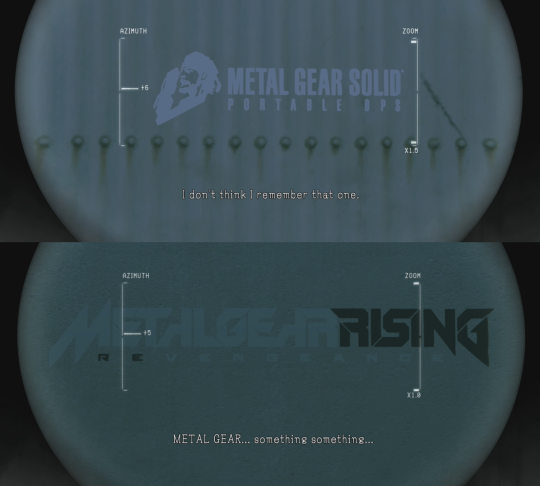
What’s it going to be? Loyalty to Konami, or loyalty to Kojima? A faceless corporation, or the creator of the series? Pachinko slot machines, or an auteur’s vision? In the end, you have to choose whether you’re going to respect Kojima’s artistic integrity, or if you want “just another game in a lore without end.”